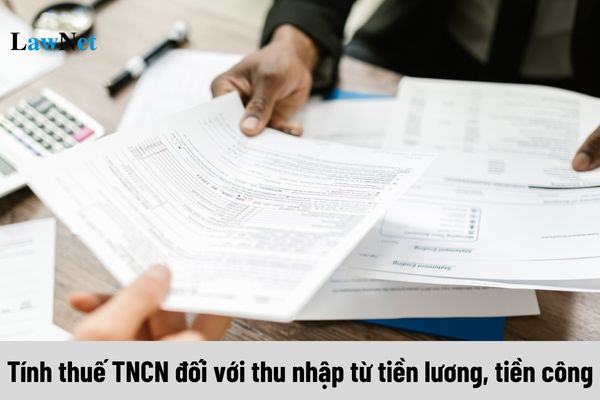What are the regulations on calculating PIT on income from salaries and remunerations for non-residents in Vietnam?
What are the regulations on calculating PIT on income from salaries and remunerations for non-residents in Vietnam?
Under the regulations stipulated in Article 18 of Circular 111/2013/TT-BTC, PIT on income from salaries and remunerations for non-residents in Vietnam is calculated as follows:
- The rate of personal income tax on incomes from wages earned by a non-resident equals the taxable income from wages multiplied by (x) 20% tax.
- The taxable income from wages earned by a non-resident is similar to that earned by a resident guided in Clause 2 Article 8 of Circular 111/2013/TT-BTC.
The taxable income from wages earned in by a non-resident that works both in Vietnam and overseas without being able to separate the income earned in Vietnam shall be calculated as follows:
+ Where the foreigner is not present in Vietnam:
|
Total income earned in Vietnam |
= |
Number of working days in Vietnam |
x |
Pre-tax global income from wages |
+ |
Other pre-tax taxable income earned in Vietnam |
|
Number of working days in the year |
Where: the number of working days in the year is calculated in accordance with the Labor Code of Vietnam.
+ Where the foreigner is present in Vietnam:
|
Total income earned in Vietnam |
= |
Number of days in Vietnam |
x |
Pre-tax global income from wages |
+ |
Other pre-tax taxable income earned in Vietnam |
|
365 days |
Note: Other pre-tax taxable incomes earned in Vietnam mentioned in Point a and Point b above are other benefits in cash or not in cash apart from wages that are provided for the employee or paid on the employee’s behalf by the employer.

What are the regulations on calculating PIT on income from salaries and remunerations for non-residents in Vietnam? (Image from the Internet)
What does income subject to PIT in Vietnam according to the latest regulations include?
Taxable income includes the following as regulated in Article 3 of the Personal Income Tax Law 2007 and amended by Article 2 of the Law amending various tax laws 2014:
Incomes from business include:
+ Incomes from manufacturing, sale of goods or services;
+ Income from freelance works of individuals having licenses or practicing certificates as prescribed by law.
A sole trader’s income of VND 100 million per year or less is not considered income from business.
Incomes from salaries and remunerations, including:
+ Salaries, wages and amounts of similar nature;
+ Allowances, except for those paid under legal provisions on preferential treatment of persons with meritorious services; defense or security allowances; hazard or danger allowances for persons working in branches, occupations or jobs at places where exist hazardous or dangerous elements; allowances for attraction of laborers to work in certain branches or in certain regions specified by law; allowances for sudden difficulties, allowances for laborers having labor accident or suffering from occupational disease, lump-sum maternity or child adoption allowances; allowances for working capacity loss, lump-sum retirement allowances, monthly survivorship allowances, severance and job loss allowances specified in the Labor Code, other allowances paid by the Social Insurance, and allowances for combat of social evils;
+ Remuneration of all kinds;
+ Sums of money earned for participation in business associations, boards of directors, control boards, management boards and other organizations;
+ Other monetary or non-monetary benefits received by taxpayers;
+ Bonuses, rewards, except for rewards accompanying honorary titles conferred by the State or international or national prizes; rewards for technical renovations, creations or inventions recognized by competent state agencies; rewards for detection and reporting of illegal acts to competent state agencies.
Incomes from capital investment, including:
+ Interests;
+ Dividends;
+ Incomes from capital investment in other forms, except for government bond interests.
Incomes from capital transfer, including:
+ Incomes from transfer of capital holdings in economic organizations;
+ Incomes from transfer of securities;
+ Incomes from transfer of capital in other forms.
Incomes from transfer of real estate, including:
+ Incomes from transfer of rights to use land and assets attached to land;
+ Incomes from transfer of right to own or use residential houses;
+ Incomes from transfer of right to lease land or water surface;
+ Other incomes earned from transfer of real estate.
Incomes from won prizes, including:
+ Lottery winnings;
+ Sales promotion winnings;
+ Prizes won from betting;
+ Winnings in prized games and contests and other forms of winning.
Incomes from copyright, including:
+ Incomes from assignment or licensing of intellectual property objects;
+ Incomes from technology transfer.
Incomes from commercial franchising.
Incomes from inheritances that are securities, capital holdings in economic organizations or business establishments, real estate and other assets subject to ownership or use registration.
Incomes from gifts that are securities, capital holdings in economic organizations or business establishments, real estate and other assets subject to ownership or use registration.
Who are PIT payers in Vietnam?
According to Article 2 of the Personal Income Tax Law 2007, the PIT payers include:
- Personal income taxpayers include residents who earn taxable incomes specified in Article 3 of Personal Income Tax Law 2007 inside and outside the Vietnamese territory and non-residents who earn taxable incomes specified in Article 3 of Personal Income Tax Law 2007 inside the Vietnamese territory.
- Resident means a person who satisfies one of the following conditions:
+ Being present in Vietnam for 183 days or more in a calendar year or 12 consecutive months counting from the first date of their presence in Vietnam;
+ Having a place of habitual residence in Vietnam, which is a registered place of permanent residence or a rented house for dwelling in Vietnam under a term rent contract.
- Non-resident means a person who does not satisfy any of the conditions specified above.

